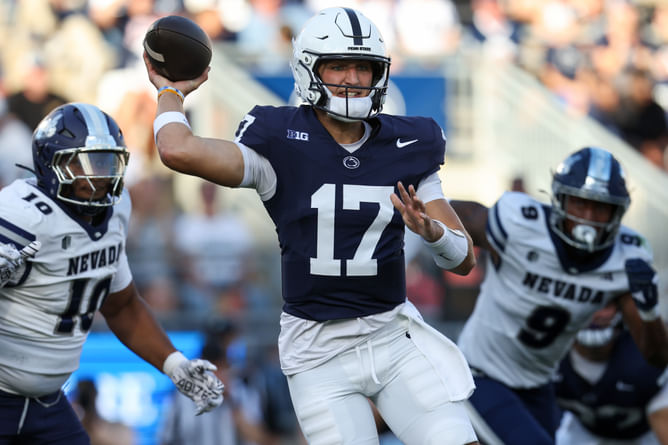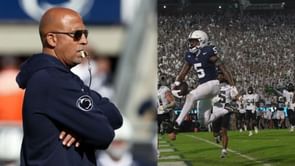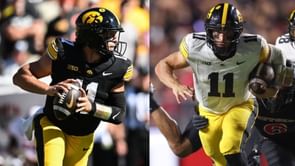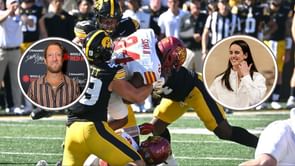Team Information
| Ground | Kinnick Stadium |
| City | Iowa City, Iowa |
| Conference | Big Ten, |
| Nickname | Hawkeyes |
Iowa Hawkeyes Football Bio
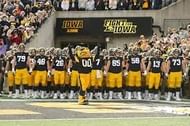
The Iowa Hawkeyes football program stands as a venerable force within the collegiate gridiron, proudly representing the University of Iowa in the robust college football arena. Since their induction into the Big Ten Conference in 1899, the Hawkeyes have woven a rich tapestry of tradition and triumph. Commanding Kinnick Stadium in Iowa City, the Hawkeyes, under the astute leadership of Head Coach Kirk Ferentz, now in his remarkable 25th season, epitomize resilience and excellence. With 13 conference championships, including 11 in the Big Ten, and a storied history that has seen them ascend to the coveted #1 spot in both the AP and Coaches Poll on 15 occasions, the Hawkeyes perennially carve their mark in the annals of NCAA Division I FBS football.
| Name of Team | Iowa Hawkeyes Football |
| First season | 1889 |
| Athletic director | Beth Goetz |
| Head coach | Kirk Ferentz 25th season, 196–117 (.626) |
| Stadium | Nile Kinnick Stadium (capacity: 69,251) |
| Location | Iowa City, Iowa |
| Conference | Big Ten Conference |
| Division | West |
| Field surface | Field Turf |
| Conference titles | 13 (11 Big Ten, 1 MVIAA, 1 WIUFA) |
| Division titles | 3 (2015, 2021, 2023) |
| Fight Song | Iowa Fight Song |
| Mascot | Herky the Hawk |
| Rivalries | Iowa State (rivalry) Minnesota (rivalry) Nebraska (rivalry) Wisconsin (rivalry) |
| Consensus All-Americans | 31 |
The University of Iowa, a distinguished public research institution nestled in Iowa City, stands as an academic trailblazer and a powerhouse in collegiate sports. Established in 1847, it is the oldest university in the state. The university's 12 colleges, boasting over 200 areas of study and seven professional degrees, foster a vibrant academic community. Nestled on a sprawling 1,880-acre campus along the Iowa River, the university holds the prestigious classification of "R1: Doctoral Universities – Very high research activity," with research expenditures reaching $818 million in fiscal year 2021.
Athletically, the University of Iowa takes the field with pride as the home of the Iowa Hawkeyes. Competing in Division I of the NCAA and proudly representing the university in the Big Ten Conference, the Hawkeyes' 22 varsity athletic teams embody the spirit of their alma mater. Beyond sports, the university's pioneering legacy includes being the first among public universities in the United States to become coeducational, host a religious studies department, and establish a coeducational medical school. With a thriving student body of 31,000 engaged in nearly 500 organizations, the University of Iowa continues to shape the academic and athletic landscape while boasting a formidable alumni network of over 250,000 graduates.
Iowa Hawkeyes History
Football found its roots at the University of Iowa in 1872, initially as a club sport, evolving into intramural contests against other colleges by 1882. In 1889, the university officially recognized its first varsity football team. By 1899, Iowa, as an independent team, celebrated its inaugural undefeated season, earning an invitation to join the Western Conference (now the Big Ten) in 1900. The Hawkeyes continued their success with another undefeated season, clinching a share of the Western Conference title in their debut conference year. In 1907, Iowa co-founded the Missouri Valley Intercollegiate Athletic Association but eventually returned to exclusive competition in the Western Conference after tying for the league championship in its first season.
Under the helm of Hall of Fame coach Howard Jones, the Hawkeyes achieved glory, claiming consecutive Big Ten titles in 1921 and 1922 and earning national recognition as champions. However, the 1930s saw a downturn as Jones departed for Southern California, leaving Iowa struggling until a resurgence in the ensuing years.
Iowa Hawkeyes Head Coach
Eddie Anderson's commitment to duty during World War II led to his hiatus from coaching the Iowa Hawkeyes from 1943 to 1945. The program, inaugurated in 1889, appointed its first head coach in 1892. Iowa has seen 25 head coaches throughout its storied history, with Kirk Ferentz taking the reins in 1999. Under Ferentz's leadership, the Hawkeyes have experienced considerable success, marking his tenure as the longest in NCAA Division I FBS. Ferentz's impact extends beyond the gridiron, influencing the university's football legacy and fostering a tradition of excellence.
| Coach | Season | Games | Pct. |
| Alfred E. Bull (1896) | 1 | 9 | .833 |
| John Chalmers (1903–1905) | 3 | 32 | .750 |
| Howard Jones (1916–1923) | 8 | 60 | .708 |
| Alden Knipe (1899–1902) | 5 | 44 | .705 |
| Forest Evashevski (1952–1960) | 9 | 83 | .651 |
| Kirk Ferentz (1999–present) | 25 | 313 | .626 |
| Hayden Fry (1979–1998) | 20 | 238 | .613 |
| Edward A. Dalton (1892) | 1 | 6 | .583 |
| Jesse Hawley (1910–1915) | 6 | 42 | .571 |
| Burt Ingwersen (1924–1931) | 8 | 64 | .547 |
| Eddie Anderson ^ (1939–1949) | 8 | 70 | .514 |
| Roger Sherman (1894) | 1 | 9 | .500 |
| Otto Wagonhurst (1897) | 1 | 8 | .500 |
| Ben "Sport" Donnelly (1893) | 1 | 7 | .429 |
| Oscar "Ossie" Solem (1932–1936) | 5 | 40 | .425 |
| Mark Catlin (1906–1908) | 3 | 17 | .412 |
| Jerry Burns (1961–1965) | 5 | 45 | .378 |
| Leonard Raffensperger (1950–1951) | 2 | 18 | .361 |
| John Griffith (1909) | 1 | 7 | .357 |
| Ray Nagel (1966–1970) | 5 | 49 | .337 |
| Bob Commings (1974–1978) | 5 | 55 | .327 |
| Clem Crowe (1945) | 1 | 9 | .222 |
| Irl Tubbs (1937–1938) | 2 | 16 | .156 |
| Edward "Slip" Madigan (1943–1944) | 2 | 16 | .156 |
| Frank Lauterbur (1971–1973) | 3 | 33 | .136 |
Iowa Hawkeyes Stadium: Kinnick Stadium
Nestled in Iowa City, the Historic Nile Kinnick Stadium stands as an emblem of Hawkeyes pride, serving as the venerable home turf for the University of Iowa football team. Originally known as Iowa Stadium, this architectural marvel replaced its predecessor, Iowa Field, with a swift construction period of seven months between 1928 and 1929. With a seating capacity of 69,250, it ranks as the seventh-largest stadium in the Big Ten and one of the nation's top 20 university-owned stadiums. The stadium's namesake, Nile Kinnick, a 1939 Heisman Trophy winner who made the ultimate sacrifice during World War II, lends his legacy to this historic venue. Beyond its gridiron significance, Kinnick Stadium is the sole college football arena named after a Heisman Trophy recipient, immortalizing the Hawkeye legend in every touchdown and cheer.
Iowa Hawkeyes Rivals
Iowa State - Cy-Hawk Trophy
The annual matchup for the Cy-Hawk Trophy began in 1977.
The first meeting between Iowa and Iowa State was in 1894.
The rivalry resumed in 1977 after a hiatus since 1934.
The Cy-Hawk Trophy tradition was initiated by the Des Moines Athletic Club in 1977.
Iowa leads the trophy series 31–15 and the overall series 47–23 through 2023.
The game is held annually in early September near Patriot Day.
Minnesota - Floyd of Rosedale
Annual clash for the Floyd of Rosedale, Iowa's oldest trophy game, started in 1935.
The first meeting between Iowa and Minnesota was in 1891.
Floyd of Rosedale originated in 1935 after a bet involving a prize pig.
Iowa leads the trophy series at 44–42–2, while Minnesota leads the overall series 62–52–2 through 2022.
Nebraska - Heroes Trophy
The annual showdown for the Heroes Trophy commenced in 2011 when Nebraska joined the Big Ten.
The game is played on the Friday following Thanksgiving.
- Iowa leads the trophy series 8–4, while Nebraska leads the overall series 30–20–3 through 2022.
Wisconsin - Heartland Trophy
Iowa and Wisconsin have contested the Heartland Trophy since 2004.
The first meeting between the teams was in 1894.
Wisconsin leads the trophy series at 10–7 and the overall series 49–45–2 through 2022.
Iowa Hawkeyes Trophy: Cy-Hawk Trophy
The Cy-Hawk Trophy, instituted in 1977, symbolizes the annual gridiron clash between the Iowa Hawkeyes and the Iowa State Cyclones. Born from a renewed rivalry dating back to their first meeting in 1894, the tradition was rekindled in 1977 after a hiatus since 1934. Endowed by the Des Moines Athletic Club, this cherished trophy accentuates the passion of the in-state rivalry. Iowa holds the upper hand in the trophy series at 31–15, reflecting their dominance in the overall series at 47–23 through the 2023 season. This coveted trophy encapsulates the intensity and history of the Cy-Hawk rivalry.
FAQs
The Iowa Hawkeyes football program was established in 1889.
Kirk Ferentz has been the head coach of the Iowa Hawkeyes football team since 1999.
The Hawkeyes have won 13 conference championships, including 11 in the Big Ten.
Kinnick Stadium, located in Iowa City, has a seating capacity of 69,250.
The Iowa Hawkeyes have been ranked #1 in the AP and Coaches Poll a total of 15 times.
